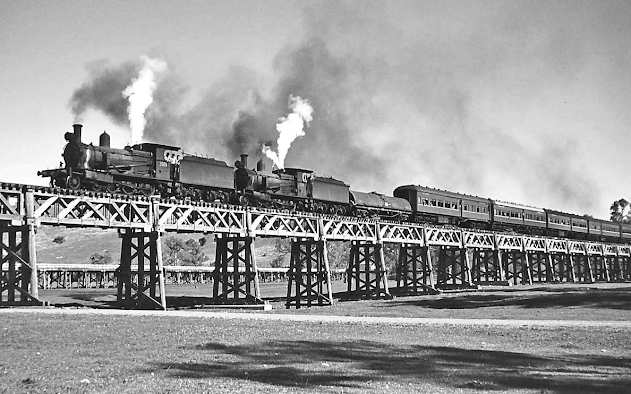20120816 Qld Blackall
20120816 Arrived a Blackall and Michael told us to check out Blackall Wool scour, so we stocked up on supplies, walked the town, had lunch at the hotel the drove out to the Wool scour.
The massive Blackall Wool scour is the only steam-driven wool scour remaining out of the 52 that once operated in full swing across the country. Operating from 1908 through until 1978 and it is Australia's heritage at its best. Wool scour means wool washing, the scour is an important part of the National Heritage. It is the only steam-driven scour Incorporating a shearing board left in Australia. In 2002 the Blackall Wool scour once again started using steam to run the machine. The Wool scour is situated next to an Artesian, free-flowing bore which supplied ample hot water for scouring.

 It
was on this stand (the woolscour shed) in 1942 Charlie Davidson of Blackall
crutched 40,000 sheep in 40 working days, he was crutching on his own with one
man penning up and sweeping. Now that's the old working class man.
It
was on this stand (the woolscour shed) in 1942 Charlie Davidson of Blackall
crutched 40,000 sheep in 40 working days, he was crutching on his own with one
man penning up and sweeping. Now that's the old working class man.

 Shearing
Shed – At the time when mechanical shearing was replacing blade shearing, the
establishment of this 20 stand shed was welcomed by wool growers on small
selections who did not have capital to acquire new plants. Drovers also used the facilities when moving
through the district to shear or crutch their flock. During the first two decades, in excess of
100,000 sheep were shorn per annum.
Shearing
Shed – At the time when mechanical shearing was replacing blade shearing, the
establishment of this 20 stand shed was welcomed by wool growers on small
selections who did not have capital to acquire new plants. Drovers also used the facilities when moving
through the district to shear or crutch their flock. During the first two decades, in excess of
100,000 sheep were shorn per annum.



The massive Blackall Wool scour is the only steam-driven wool scour remaining out of the 52 that once operated in full swing across the country. Operating from 1908 through until 1978 and it is Australia's heritage at its best. Wool scour means wool washing, the scour is an important part of the National Heritage. It is the only steam-driven scour Incorporating a shearing board left in Australia. In 2002 the Blackall Wool scour once again started using steam to run the machine. The Wool scour is situated next to an Artesian, free-flowing bore which supplied ample hot water for scouring.
The circle of friends is the people that make up the community that live on the Barcoo River. The friends are represented by a circle using gate hinges, which are all united. The overall sculpture is evocative of a windmill, reflecting the importance of water, its use in rural towns and graziers and being essential for survival. The gate hinges individually represent people and animals who are in this community together, but collectivity represent the many who have passed by and along the Barcoo, the many who have gone it's gate way, to the vast inner region where the Barcoo drains into Lake Eyre.

Mechanical wool scouring
required hot, soft water and Blackall’s bore water was perfect for the
job. At its peak, almost 3 million
litres of bore water flowed each day, of which 910,000 litres were used in the
scour. The free flowing water of the
bore sunk in 1906 still flow at the woolscour, and at the local Aquatic Centre
where you can soak in the water.
 It
was on this stand (the woolscour shed) in 1942 Charlie Davidson of Blackall
crutched 40,000 sheep in 40 working days, he was crutching on his own with one
man penning up and sweeping. Now that's the old working class man.
It
was on this stand (the woolscour shed) in 1942 Charlie Davidson of Blackall
crutched 40,000 sheep in 40 working days, he was crutching on his own with one
man penning up and sweeping. Now that's the old working class man.
Jack Howe or “Jackie” as he was
more affectionately known, is regarded by most as the greatest shearer to ever
grasp a pair hand blades. A world
champion & record breaking sheep shearer, Australian Labour Party pioneer,
Publican & credited as the inventor of the modern Australian ‘blue singlet’,
Jackie shot to fame in pre-Federation Australia when he broke the daily &
weekly shearing record across the colonies.
On 10th Oct 1892, Howe shore 321 sheep in 7 hours & 40
min at the Alice Down Station & he would have shorn more only he ran out of
sheep to shear. Given that a standard
working day is 8 hours he surely would have done at least another dozen. In
the weeks before his record-breaking day Jackie also broke the weekly record by
shearing 1437 sheep in 44 ½ hours, a blade tally that remains unbeaten. He was ‘the Ringer of all Ringers’, a legend
in the woolshed.
 Shearing
Shed – At the time when mechanical shearing was replacing blade shearing, the
establishment of this 20 stand shed was welcomed by wool growers on small
selections who did not have capital to acquire new plants. Drovers also used the facilities when moving
through the district to shear or crutch their flock. During the first two decades, in excess of
100,000 sheep were shorn per annum.
Shearing
Shed – At the time when mechanical shearing was replacing blade shearing, the
establishment of this 20 stand shed was welcomed by wool growers on small
selections who did not have capital to acquire new plants. Drovers also used the facilities when moving
through the district to shear or crutch their flock. During the first two decades, in excess of
100,000 sheep were shorn per annum. 
Unbaled wool was fed into the loader
to break up fleeces for more efficient scouring.

The Dryers- used heat from the
steam boilers to dry the wool before storage.
The Wool Loader- unbaled wool was feed into the loader to break up
fleeces for more efficient scouring.

The 1935 Federal Truck is the
one used to transport wood to the boilers.
The Ferrier Wool Press baled the greasy wool that was then stacked in
the Woolscour storage shed which were either unpacked and scoured or sold as
they were.







Thanks for telling me about my Uncle Charlie Davidson. I have been trying to find info about his shearing days for years.
ReplyDelete